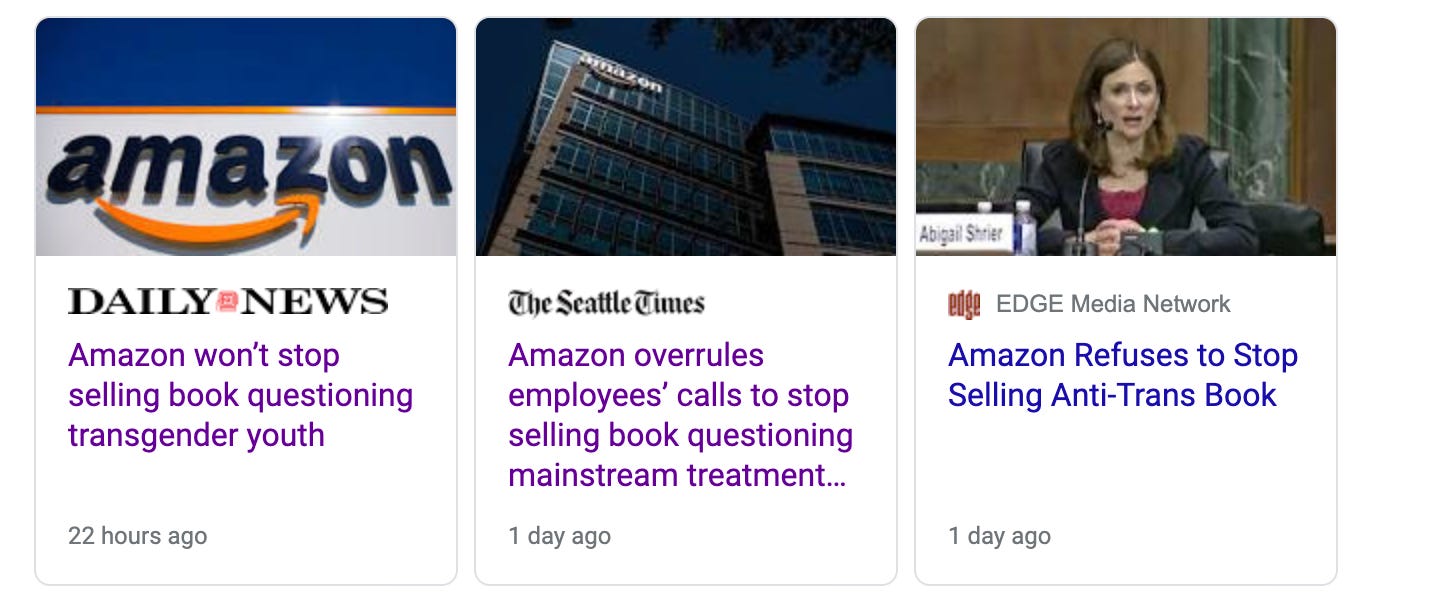-----Original Message-----
From: Abigail Shrier from The Truth Fairy <abigailshrier@substack.com>
To: add1dda@aol.com
Sent: Thu, May 6, 2021 2:26 am
Subject: Has Censorship Become Our Baseline Expectation?
Has Censorship Become Our Baseline Expectation? 

From: Abigail Shrier from The Truth Fairy <abigailshrier@substack.com>
To: add1dda@aol.com
Sent: Thu, May 6, 2021 2:26 am
Subject: Has Censorship Become Our Baseline Expectation?
Has Censorship Become Our Baseline Expectation?For America's Journalistic Inquisitors--it's free speech that's surprisingWant proof that our norms are shifting? Look no further than our headlines: "Amazon won't stop selling book questioning transgender youth" noted a surprised New York Daily News on Tuesday. "Amazon overrules employees' calls to stop selling book questioning mainstream treatment for transgender youth," declared The Seattle Times. "Amazon Refuses to Stop Selling Anti-Trans Book," reported an apparently disappointed Edge Media. And yesterday's NBCNews.com: "Amazon will not remove book advocates say endangers transgender youth." For every one of these publications, the baseline assumption is censorship. It is Amazon that "won't stop selling," or "overrules employees" or "refuses to stop selling" or "will not remove"—Amazon whose actions strike today's journalists as significant and surprising. Amazon the intransigent bookseller, stubbornly insisting on continuing to sell books. Standing up to the calls for censorship is now what surprises us. The numberless calls for book banning no longer do. The book in question was mine—Irreversible Damage—a journalistic investigation into the sudden spike in transgender identification among teen girls. The book examines current medical protocols for trans-identified youth and urges caution, warning that there is too much self-congratulation by health care providers, too little application of adult judgement. Since the consequences of a teen girl having an unnecessary gender transition can be fairly devastating, I urge us to become more disciplined and careful in how we dole out hormones and surgeries. In a prior era, the book might be considered so obvious, it might not need to have been written at all. And in fact, the current puberty-blockers-to-cross-sex-hormones regimen has already been halted in the UK and, most recently, Sweden, in view of the serious risks and speculative benefits. But today, in America and Canada, naming these risks is considered offensive—offensive, that is, to the doctors, therapists, surgeons, and gender clinics who are making careers fast-tracking youth to becoming the permanent patients of a regime of medical transition. Offensive to the parents who have already transitioned their children and can't bear if a single book in the library highlights the risks of the treatments they have applied to their own children. And it isn't only the activists who are pushing for censorship—but journalists—journalists! Those whose life's work depends on a culture of free expression. Take the reporter who called me from the Seattle Times, Katherine Anne Long. She messaged me yesterday over Twitter, asking for comment. "I'm writing an article about Amazon's refusal to remove your book from its digital shelves after employees, including leaders of Amazon's LGBTQ+ affinity group, campaigned for the company to stop selling Irreversible Damage. One employee called the book 'hate speech.' I wanted to give you the opportunity to respond." One employee. After an apparently arduous investigation, which involved "examining the content of the book in detail and calibrating with senior leadership," Amazon had determined that the book did not in fact violate its content policy. So there. But notice who bears the burden of proof, in all this—not the employees braying like Veruca Salt, "I want it now!" They bear no burden—in today's journalists' minds—to prove that my book is hateful (it isn't). Amazon, the bookseller, bears the burden of proving the book does not "frame LGBTQ+ identity as a mental illness." And I—the author—bear the burden of proving my innocence to America's journalistic Torquemadas. I told Ms. Long that the book contains not a word of hate—almost verbatim what the Economist wrote when it named mine a Best Book of 2020: "Predictably controversial—yet there is not a drop of animosity in the book." Though the book discusses "gender dysphoria," a diagnosis recognized in the DSM-5, it never equates transgender status with a mental illness because, put simply, I don't believe that it is. Well, she replied, I see 'contagion,' 'epidemic,' don't you think that tends to diagnose? "Are you seriously going to pull out random words from my book?" I asked her. "They aren't random," she said. "They're from chapter headings." I explained that the words "contagion" and "epidemic" often refer to social phenomena, like peer-to-peer fads or trends, as the dictionary bears out and is obviously the case in Irreversible Damage. But in all of this explaining, I was the witness in the hot seat, under cross-examination. I was the one who had to explain myself before this refrigerator-magnet-poetry word-jumble method of inquiry. I was the one who had penned a book that a solitary unnamed employee had declared "hate speech." To see just how far things have shifted in this regard, consider a book published in 2008, The Israel Lobby and U.S. Foreign Policy, by John J. Mearsheimer and Stephen M. Walt, shameless conspiracy theorists who accused Jews of warping American foreign policy for selfish gain injurious to American interests. Unlike mine, this book actually did single out a minority—Jews—and accused them of dual loyalty by dint of their support for Israel. And the book arguably did real harm, casting a broad net of suspicion over all American Jews who dared support the world's one Jewish country. The panic that book set off in the American Jewish community was real and pitched. And yet, I cannot remember—nor could I now discover—a single call for it to be banned. No one in public life seems to have had the temerity to demand its removal—nor did a single journalist report on booksellers' "refusal" to ban it. We all understood, then, that this was a book whose arguments we would need to examine and refute and even rail against—but live with them, we knew, we must. What happened to us—as thinkers, journalists, Americans? Our commitment to free expression, codified in the U.S. Constitution's very First Amendment, once webbed American culture like tree roots through the earth. Now it strikes us as so much useless netting. The amazing thing about my conversation with the Seattle Times reporter was not only her ironclad assumption that the burden was on me to prove my book shouldn't be banned, but that it never struck her that of all the 'experts' she had consulted about my book, every last one had a pecuniary interest in medically transitioning youth. (So much for a reporter's gimlet eye for conflicts of interest.) My interest was, and is, the same as every half-decent journalist: in shedding light. I conducted hundreds of interviews. I highlighted risks and wrote about them. I developed a perspective and defended it. Did I sell books? Yes, but, frankly, I would have sold far fewer if not for the endless efforts to ban it. My role in the story of today's fast-tracking of transgender youth should be entirely uninteresting: not a single medicine is advertised on television without a droning recitation of so many risks. What's more interesting is that so many of today's gender doctors and therapists are eager to mute all discussion of risks or trade-offs. As gender-affirmative psychologist, Diane Ehrensaft told the Seattle Times, "I'm not into book banning," Ehrensaft said. "But I can say that if I were Amazon, I would not want to represent this book." Sounds pretty 'into' book banning to me. Not to be outdone, the Seattle Times reporter was apparently so eager to see my book banned, she had sent queries to Amazon asking why it was still selling my book. "Looks like Amazon stopped selling the book after I asked the company for comment on the story," she wrote to me, before correcting herself: "I may have spoken too soon; the book still comes up with a search in an incognito window, so it may just be an issue with my account." Oh, the disappointment of an unburned book. Better luck next time? You're on the free list for The Truth Fairy. For the full experience, become a paying subscriber. |





1 comment:
Were there ANY "transgender maniacs" documented before,let's say...1950?What year did this really become literally,a "mentally contagious" disease?A pandemic of the mind.
Remember in the traveling circus,the bearded lady?In stories I heard over the years,she never thought of herself as a man--she was a woman with a beard.
In the same way that Whites are being constantly assailed for just being White--and a fair number of Whites have been convinced to be ashamed of their race--it doesn't take too much imagination to follow the same pattern concerning the spread of transgenderism.
Both problems,in my opinion,began in earnest,since the advent of social media--would you not agree--though TV has played a larger role in destroying White's achievements--and our(mostly younger White's)self-confidence.
The spread of each mental illness has been accomplished in two ways: massive peer pressure and outside influencing by on-line sites who cater to kids--is my explanation for both phenomenon exploding as they have.
And no one in professional circles will call these situations for what they are--1)unrelenting racist attacks against Whites,causing some Whites to hate themselves and 2)mental illness being hoisted on youths who don't have the self-esteem to fight back against those proponents of the TG craze.
What a country we have turned into.
--GRA
Post a Comment